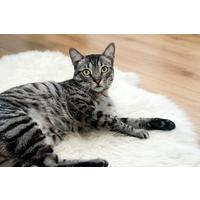Caring For Your Senior Cat

We all know that cats are amazing creatures. Just as our needs change as we gracefully age, our senior cats have different dietary needs that our adult cats and kittens.
For the longevity of our senior cats, we experience advances in veterinary care and cat nutrition which all provide us the opportunity to enjoy more years of loving and being loved by our cats. Keeping an optimal weight, good nutrition and exercise as well as a healthy environment can impact your cat’s overall health.
How do we know when our adult cat becomes a senior cat? A cat can begin approaching their senior years as early as the age of seven years old. Wellness visits to your veterinarian can determine if your cat is becoming a senior cat. You may notice cloudiness forming over an eye or both eyes. You may notice a little bit of gray fur. You may notice a slight difference in the way your cat gets up and down and moves around. It can be hard to admit as we see changes in health and behavior that indicate our cat is entering the stage in life commonly referred to as their golden years. Acknowledging it, discussing it and making a few changes can help you provide great cat care as you support your senior cat’s body. Being aware and proactive helps prevent and manage the senior cat years providing the best quality of life possible for your beloved senior cat.
Your veterinarian, a well balanced cat food designed specifically for senior cats, maintaining the appropriate level of exercise, play, affection and providing a safe environment can keep your senior cat healthier and aging as well as possible.
5 Care Tips for your Senior Cat
- Keep your litter box very accessible. Keep it clean, tidy and monitor eliminations. Report changes to the veterinarian.
- Keep fresh water in a clean bowl available at all times. If your cat appears to be losing weight, drinking more or less or begins eliminating more or less, report these changes immediately to your veterinarian as your cat could have a bladder condition or kidney disease. There are cat food diets which are formulated to help prevent, manage and support a healthy bladder.
- Gaining weight can become a problem for our senior cats.They may exercise a bit less, have decreased metabolism or even decreased mobility. Changing to a cat food which is for our senior cats is a great idea to provide weight management for your senior cat.
- Senior cats often groom less frequently. Assist them with their grooming by brushing more frequently and make sure they are getting the nutrition they need from their cat food. They could need a cat food formulated to help reduce hairballs and help maintain their skin and hair. Consider a cat food formula which is formulated containing omega-3 fatty acids. As you assist with cat grooming, be sure to monitor and report any changes in skin and hair condition as well as any lumps or bumps. If medications such as topical drops are to much for them as they age, you may want to consider pest repeller's to keep fleas and insects away.
- As you keep your senior cat on track, remember eyesight and hearing may diminish. Just as your cat has always loved the routine in your life, change could be even more difficult and stressful to manage as a senior cat. Keep your cat’s stress level in mind and provide plenty of patience and affection with any routine changes. Provide as much consistency as possible for your senior cat.
A properly formulated cat food , maintaining optimal weight and regular visits to the veterinarian will be crucial in helping provide the best quality of life possible for your beloved senior cat.

 for Dog Products & Supplies
for Dog Products & Supplies
 for Dog Food
for Dog Food
 for Cat Products & Supplies
for Cat Products & Supplies
 for Cat Food
for Cat Food
 for Reptiles
for Reptiles
 for Small Animals
for Small Animals
 for Aquarium
for Aquarium
 for Bird Products & Supplies
for Bird Products & Supplies
